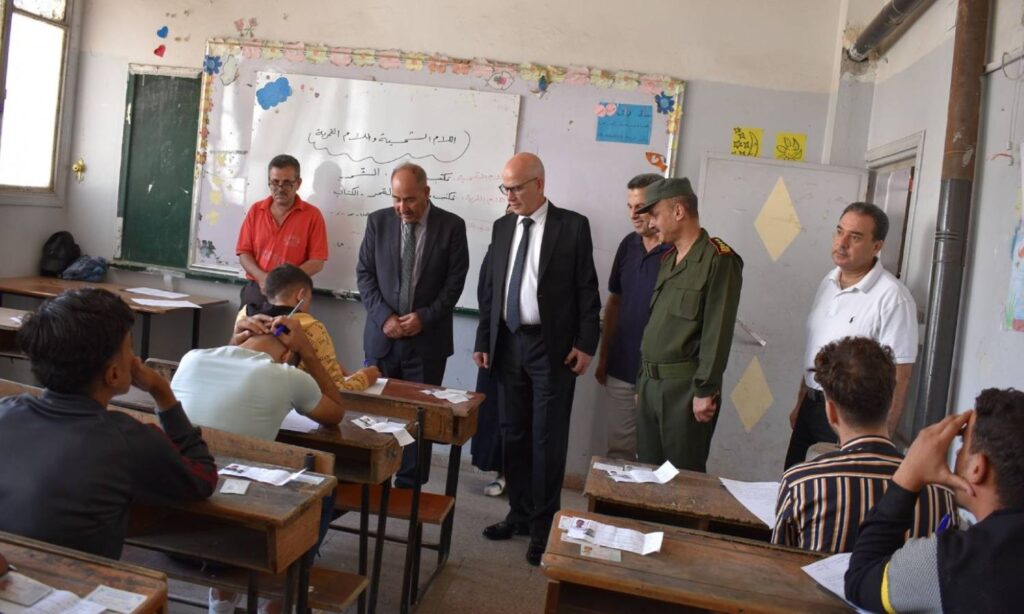Daraa – Halim Muhammad
A noticeable decline was shown by the results of the preparatory certificate in the level of education in basic and preparatory schools in the al-Lajat area in southern Daraa governorate amid high repetition rates and low student grades for the current academic year.
Activists attributed this decline to the lack of teachers for basic subjects and the lack of interest of the Daraa Education Directorate in the al-Lajat schools, which was reflected on the general level in the preparatory certificate.
Teacher shortage
Al-Lajat-based activist Rima al-Ali told Enab Baladi that the largest percentage of repetitions was in the French language and that most of the region’s schools lack teachers.
After 2011, al-Lajat lost most of its teachers from the youth category due to security pursuits, the request for military service, in addition to the youth seeking to emigrate. Most of the teachers in the region are considered residents of other areas in Daraa governorate, forcing them to pay transportation expenses to reach their places of work.
Hiam, a teacher in one of the schools in Daraa, who requested that her full name not be used for security reasons, told Enab Baladi that any movement between the regions in the governorate costs teachers additional fees, which made them want to teach in the same areas of their residence.
For teaching in villages and areas far from the teacher’s places, the Directorate of Education in Daraa governorate does not pay any additional compensation over the teachers’ monthly salaries.
Hiam attributed the lack of French language teachers to the abolition of the French language department at Daraa University since 2012, which led to a scarcity of French teachers in the southern governorate.
The Al-Lajat Press Facebook page, which is interested in publishing the news of the residents of al-Lajat, said that the preparatory certificate students ended the school year with a shortage of teachers in some disciplines such as French, English, and mathematics, and the website monitored the failure of at least 80 percent in English and French subjects.
The website pointed out that the high transportation fees and low teachers’ salaries are among the main reasons for the lack of teachers.
The price of a liter of gasoline in Daraa governorate reached about 7000 SYP (about 2 USD), while the price of a liter of diesel reached about 5500 SYP on the black market, amid the lack of availability of subsidized ones.
Activist al-Ali told Enab Baladi that the lack of teachers in some specializations has prompted school principals to hire teachers who hold a high school diploma, who in turn do not have enough experience to teach.
Education sector neglected
Residents of the al-Lajat area complained about the Education Directorate’s neglect of the school’s work by not sending enough teaching staff and not following up on the school’s work, as well as the failure to conduct inspection visits, monitoring, and administrative punishment for the negligence, which have not been fruitful so far.
The activist al-Ali considered that the failure of the Education Directorate is one of the most important reasons for the failure of the educational process in the al-Lajat area.
The Education Directorate is responsible for providing teachers, as well as providing books, renovating schools, and conducting periodic visits to inspect and evaluate teachers’ work, and this has not happened since the regime retook control in 2018, she added.
One of the al-Lajat notables, who asked not to be named for security reasons, said the educational complex responsible for the educational process in the region is neglected and does not care about the reality of teaching in the region.
He added to Enab Baladi that it is based on a hypothesis that destroyed the area educationally, which is that the “al-Lajat area is not safe,” which led to the spread of administrative corruption inside schools with the absence of oversight by the directorate, as he described it.
No recent statistics are available on the number of residents of al-Lajat, or the number of students in it, as dozens of villages are spread over its area, distributed between the governorates of Daraa and As-Suwayda.
The population of the villages on the western side of al-Lajat, which is administratively located in Daraa governorate, is 10,330 people, according to a thesis prepared for obtaining a master’s degree in regional geography at Damascus University in 2014.
Last January, the United Nations Children’s Fund (UNICEF) estimated the number of children deprived of education in Syria over the past ten years at more than two million.
According to a UN statement, there are more than 2.4 million children out of school, about 40 percent of whom are girls. The statement also attributed the high number to the repercussions of the Covid-19 pandemic and the resulting disruption of the educational process in Syria.
Rami Dhalli, head of the Basic Education Department in the regime’s Education Ministry, revealed last March in an interview with Melody FM radio that the percentage of children who have dropped out of school in some governorates reaches 12 percent of the governorate’s students.

